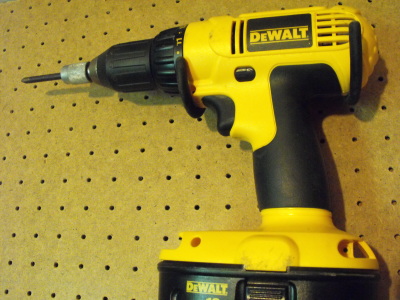
DeWalt 18 volt mini review
 Our Black and
Decker 18 volt drill has been replaced with a DeWalt.
Our Black and
Decker 18 volt drill has been replaced with a DeWalt.
You can feel the increased
power and torque the first time you use this beauty.
Well worth the extra cost if
you find yourself delving into more advanced projects.
Want more in-depth information? Browse through our books.
Or explore more posts by date or by subject.
About us: Anna Hess and Mark Hamilton spent over a decade living self-sufficiently in the mountains of Virginia before moving north to start over from scratch in the foothills of Ohio. They've experimented with permaculture, no-till gardening, trailersteading, home-based microbusinesses and much more, writing about their adventures in both blogs and books.
Want to be notified when new comments are posted on this page? Click on the RSS button after you add a comment to subscribe to the comment feed, or simply check the box beside "email replies to me" while writing your comment.

Is the DeWalt also 18 volt? Is it just a more powerful 18 volts? What's up with that? :^)
(Seriously, I would've naively assumed that the only thing that affected the powerfulness of the drill was how much power it used...)
Power is the result of battery voltage + tool efficiency (motor, switch, transmission etc.).
Runtime is the result of battery voltage + battery amp-hour + tool efficiency (motor, switch, transmission etc.).
Chemistry determines the size and weight of the battery and it’s durability. Chemistry does NOT impact power or runtime.
The last statement is not entirely true. Li-Ion batteries can overheat if drained at very high rates. There is current-limiting circuitry in either tools or batteries that prevent that from happening. I compared Makita BHP451 with DeWalt DC925 with NiCd battery, and even though Makita claims to have higher torque and lower RPM (300 vs 450 on DeWalt), drill got stuck when I tried to drill a pine 4x4 with a 2 inch hole saw, while DeWalt just slowed down. DeWalt's Nano batteries have higher discharge current (=more power) and lower capacity as a tradeoff. Cells in Makita batteries are 1460 mAh while DeWalt 18v nano's are 1100 mAh, yielding ~3 and 2.2 Ah (2.3 Ah for 28v and 36v) batteries respectively. Current-limiting circuitry is a good thing.
The above information was created by the author of the awesome forum at Digital Reality Crew.
http://forum.drc.su/dewalt-nano-battery-technology-faq-vt4382.html
What is the technology inside the DEWALT batteries with NANO Technology?
To create the battery technology initially introduced in the 36V system, DEWALT partnered with A123Systems, a developer of a new generation of lithium ion batteries that incorporates nanoscale technology developed at and exclusively licensed from Massachusetts Institute of Technology. The DEWALT battery technology has a unique NANO-phosphate lithium ion design that offers a high level of power, runtime and life compared to conventional lithium ion technology. For example, the NANO-phosphate battery delivers 2,000 recharges (over 3x more life than any other formula of lithium ion we evaluated). NANO-Phosphate is available in three voltages: